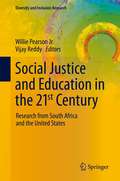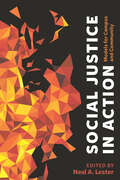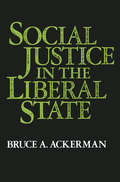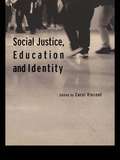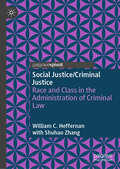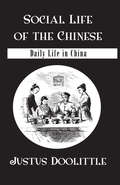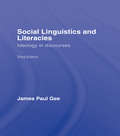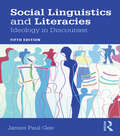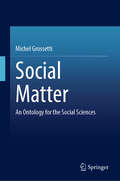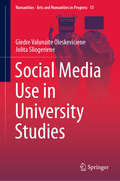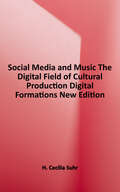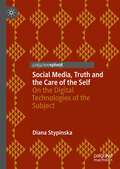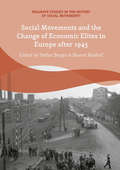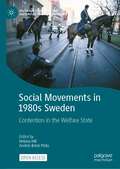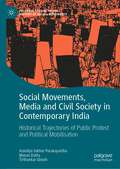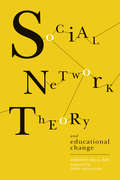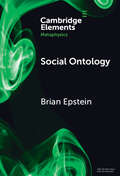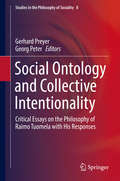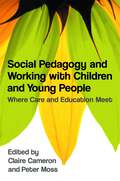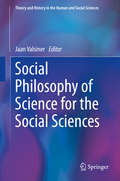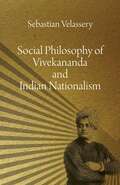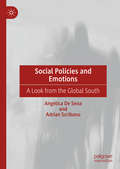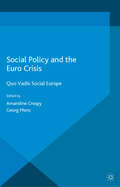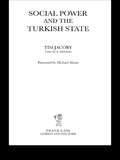- Table View
- List View
Social Justice and Education in the 21st Century: Research from South Africa and the United States (Diversity and Inclusion Research)
by Vijay Reddy Willie Pearson Jr.The world is not an equal place. There are high- and low-income countries and high- and low-income households. For each group, there are differential educational opportunities, leading to differential educational outcomes and differential labor market opportunities. This pattern often reproduces the privileges and inequalities of groups in a society. This book explores this differentiation in education from a social justice lens. Comparing the United States and South Africa, this book analyzes each country’s developmental thinking on education, from human capital and human rights approaches, in both primary and higher education. The enclosed contributions draw from different disciplines including legal studies, sociology, psychology, computer science and public policy.
Social Justice in Action: Models for Campus and Community
by Neal A. LesterAddressing both veterans of justice work and novices seeking points of entry, the essays in this volume showcase practical approaches to diversity, equity, and inclusion: ways to build community, earn trust, tell unheard stories, and develop solutions to problems. Emphasizing values such as empathy, self-reflection, and integrity, the volume is rooted in humanities work but also features contributions from fields as diverse as the performing arts, architecture, and evolutionary biology and represents settings beyond the college campus, such as schools, libraries, museums, and prisons. While bringing insights from higher education, it critiques the system as well, exploring the ways that institutions reinforce power structures and exclude marginalized voices. Interspersed with the essays, brief reflections by activists and artists offer testimony and inspiration.
Social Justice in the Liberal State
by Bruce AckermanCertain to become the most important work in political theory since John Rawls's A Theory of Justice, this book presents a brilliantly original, compelling vision of a just society-a world in which each of us may live his own life in his own way without denying the same right to others. Full of provocative discussions of issues ranging from education to abortion, it makes fascinating reading for anyone concerned with the future of the liberal democratic state.
Social Justice, Education and Identity
by Carol VincentThis book answers key questions regarding social justice in education. Its central theme is how the education system, through its organization and practices, is implicated in the realisation of just or unjust social outcomes. In particular, the writers examine the ways in which the identities of individuals and groups are formed and transformed in schools, colleges and universities.The book contains examples drawn from early years through to higher education. It has a dual focus, addressing:* theoretical debates in social justice, including how the concept of social justice can be understood, and theoretical issues around social capital, and class and gender reproduction* the formation of learner identities focusing on how these are differentiated by class, ethnicity, gender, sexuality and (dis)ability.Carol Vincent has assembled a wide-ranging collection of lucidly argued essays by a panel of internationally respected contributors. The authors draw on their current and recent research to inform their writing and so theory is balanced with extensive empirical evidence. Therefore the debates continued here have implications for policy and practice, as well as being theoretically and analytically rich.This book will provide unrivalled coverage of the subject for researchers, academics, practitioners and policymakers in education.
Social Justice/Criminal Justice: Race and Class in the Administration of Criminal Law
by William C. HeffernanThis book builds on Heffernan's last book Rights and Wrongs: Rethinking the Foundations of Criminal Justice by examining the class and racial disparities at the heart of current law — disparities that, according to many, generate a system of criminal injustice. It argues that these disparities run throughout the legal system; they’re present in policing, corrections, and sentencing. It discusses the relationship between the two kinds of justice — social justice and criminal justice and how to ensure fairness in state-imposed punishment. It theorises the extent to which criminal law must address considerations of social justice to ensure a fair system. It proposes a framework for analyzing disparities, provides an overview of contemporary research concerning them, and offers reform proposals for addressing them. Written in an accessible way, it introduces readers to philosophical theory and doctrines in constitutional law and thus it speaks to a wide audience concerned about racial and class disparities in the criminal justice system. It responds to a half-century’s worth of public concern about the legitimacy of the state’s exercise of its penal power while explaining the pertinence of social justice principles to the criminal justice system.
Social Life Of The Chinese: With Some Account Of The Religious, Governmental, Educational, And Business Customs And Opinions. With Special But Not Exclusive Reference To Fuchchau
by DoolittleFirst Published in 2005. Routledge is an imprint of Taylor & Francis, an informa company.
Social Linguistics and Literacies: Ideology in Discourses (Critical Perspectives On Literacy And Education Ser.)
by James GeeThis fully-updated new edition engages with topics such as orality and literacy, the history of literacy, the uses and abuses of literacy in that history, the analysis of language as cultural communication, and social theories of mind and meaning, among many other topics. It represents the most current statement of a widely discussed and used theory about how language functions in society, a theory initially developed in the first edition of the book, and developed in this new edition in tandem with analytic techniques for the study of language and literacy in context, with special reference to cross-cultural issues in communities and schools. Built around a large number of specific examples, this new edition reflects current debates across the world about education and educational reform, the nature of language and communication, and the role of sociocultural diversity in schools and society. One of the core goals of this book, from its first edition on, has been to develop a new and more widely applicable vision of applied linguistics. It will be of interest to researchers, lecturers and students in education, linguistics, or any field that deals with language, especially in social or cultural terms.
Social Linguistics and Literacies: Ideology in Discourses (Critical Perspectives On Literacy And Education Ser.)
by James GeeIn its first edition, Social Linguistics and Literacies was a major contribution to the emerging interdisciplinary field of sociocultural approaches to language and literacy, and was one of the founding texts of the 'New Literacy Studies'. This book serves as a classic introduction to the study of language, learning and literacy in their social, cultural and political contexts. It shows how contemporary sociocultural approaches to language and literacy emerged and: Engages with topics such as orality and literacy, the history of literacy, the nature of discourse analysis and social theories of mind and meaning Explores how language functions in a society Surveys the notion of 'discourse' with specific reference to cross-cultural issues in communities and schools. This fifth edition offers an overview of the sociocultural approaches to language and literacy that coalesced into the New Literacy Studies. It also introduces readers to a particular style of analyzing language-in-use-in-society and develops a distinctive specific perspective on language and literacy centered on the notion of "Discourses". It will be of interest to researchers, lecturers and students in education, linguistics, or any field that deals with language, especially in social or cultural terms.
Social Matter: An Ontology for the Social Sciences
by Michel GrossettiThis book helps answer a fundamental question: What is the social world made of? It presents a comprehensive ontology of social entities, activities, and relations. Basic building blocks of the social world, from humans and animals to objects and cognitive entities are explored, while also posing open questions about the status of living beings. By introducing more complex social forms, such as networks and collectives, and examining how these emerge through shared resources and interactions the author applies the familiar social science notions like classes and organizations and explores life courses and causality within social phenomena. As a whole, this book offers an innovative framework for understanding the social world, inviting scholars and readers in philosophy, social sciences, and political sciences to rethink the entities and processes that shape our social reality.
Social Media Use in University Studies (Numanities - Arts and Humanities in Progress #13)
by Jolita Sliogeriene Giedre Valunaite OleskevicieneThis book highlights the phenomenon of social media use in university studies based on its participants’ lived experience. It will appeal both to academics and practitioners interested in the human factors in the study environments saturated with technologies of social media. This book reveals multiple, sometimes contradictory dimensions of the phenomenon. The contradictions acquire a binary Janus-faced characteristic of uncertainty and paradox. Social media use in university studies also causes changes in experiencing time, space and relations. Teacher research participants sometimes perceive their time as stress or an additional load, which shows that social media use in university studies demands a new approach to teacher workload and its regulation. There is also the necessity of the sensitive democratic teacher—student pedagogical relationship. This book proves that the pedagogical relationship and human creativity essentially belong to the human living world and are still at the heart of the technological “cyborgian” existence.
Social Media and Music: The Digital Field of Cultural Production
by H. Cecilia SuhrThis book explores social networking sites as the digital field of cultural production by loosely drawing from Pierre Bourdieu’s notion of field and capital. The book examines four case studies on MySpace, YouTube, Second Life, and Indaba Music, and the roles and the impact they have on the music industry and musicians. In doing so, the author explores the groundbreaking developments that empower independent musicians and problematizes the emergence of a variety of issues symptomatic of social media environments at the height of convergence culture.
Social Media, Truth and the Care of the Self: On the Digital Technologies of the Subject
by Diana StypinskaThis book explores the relationship between (post)truth and subjectivity by focusing on social media as a site of digital subjectification. These days, truth is cheap. Anyone can claim it. Indeed, most do – impudently and without any recourse to facts or objective reality. Truth-claims today are nothing but power grabs, employed in the permanent popularity contest that our culture and politics have become. Correspondingly, our very sense of reality is perpetually uprooted. Post-truth sets us adrift. Navigating by smartphones, we pursue endless mirages, coming to wonder whether the shoreline itself is a myth. The book examines the ways in which different digital practices – such as influencing, trolling and digital activism – operate as technologies of the subject, shaping how we relate to ourselves, others and the world. It argues that social media facilitates the progressive eclipsing of our subjective (dis)positions by the economic imperative. Positioning post-truth as the outcome of unbridled economicization, it exposes the true costs of its supremacy. The critical reflections on the relationship between digital subjectification and the social offered by this book will be of relevance to academics and students working in the fields of sociology, media and cultural studies, politics, and philosophy.
Social Movements and the Change of Economic Elites in Europe after 1945 (Palgrave Studies in the History of Social Movements)
by Stefan Berger Marcel BoldorfThis book explores the changing nature of social movements and economic elites in post-Second World War Europe. In the years following 1945, Europe faced diverse challenges connected by the overriding question of how the reconstruction of the continent should proceed. For the Central Powers, the implementation lay in the hands of the Allied occupying forces who organised the process of denazification and the establishment of a new economic order. In countries without military occupation, there was a deep gap between the new governmental forces and the former collaborators. In both cases, social movements which were formed by anti-fascists on the left of the political spectrum assumed the task of social reorganisation. The chapters in this book explore the discourses about economic systems and their elites which moved to the fore across a range of European countries, uncovering who was involved, what resistance these social movements faced and how these ultimately failed in the West to bring about change, while in Eastern Europe Stalinism forcibly imposed change.
Social Movements in 1980s Sweden: Contention in the Welfare State (Palgrave Studies in the History of Social Movements)
by Helena Hill Andrés Brink PintoThis open access book discusses the emergence and development, and in some cases also the disappearance, of social movements and activism in Sweden during the 1980s. Its aim is to nuance and problematize the image of the 1980s as unilaterally dominated by right-wing politics and neoliberalism, as well as the idea of a conflict-free Scandinavian model. The 1980s have often been described as a period when the influence of radical-left movements during the 1970s diminished. Instead, this book argues that the 1980s was a decade in which new radical social movements emerged in opposition to the prevalent political order, including the nuclear disarmament movement, the women's movement, anti-fascist movements, and the punk and environmental movements. The authors also demonstrate how issues such as squatting, nuclear resistance, rent strikes and the environment, included a variety of contentious collective action. Sweden, therefore, presents an interesting example of how resistance and conflict in a strong welfare state have been influenced by contentious social movements. Placing Sweden within the wider context of Scandinavia and Europe, this edited collection makes an important contribution to the history of social movements.
Social Movements, Media and Civil Society in Contemporary India: Historical Trajectories of Public Protest and Political Mobilisation (Palgrave Studies in the History of Social Movements)
by Anindya Sekhar Purakayastha Manas Dutta Tirthankar GhoshThis book examines instances of transformative dissent, turning points or shifts in popular mobilisation patterns in contemporary India, while adopting a historical approach and analysing past events. Exploring the different continuities and discontinuities in mobilising patterns and dissident agency in India, the authors present a heterogeneous insurrectional pattern that pivoted around issues of caste, class, religion, land reform, labour, taxation and territorial control, with anti-colonialism movements becoming prominent in the first half of the twentieth century. The authors move beyond this to explore more recent templates of mobilisation which surfaced towards the end of the twentieth century, during India’s liberalisation period. With growing marketisation and technological advancement, unprecedented changes in social relations, growing economic opportunities and cultural transfusion taking place, the country became a ‘New India’ - one which aspired to be a global player in the wider technological public sphere. Tracing the historical trajectories of social movements in India, this book examines recent trends in digitised dissidence and explores new frontiers of protests, providing fresh insights for those researching the history of social movements, South Asian and Indian history and postcolonial studies.
Social Network Theory and Educational Change
by Alan J. DalySocial Network Theory and Educational Change offers a provocative and fascinating exploration of how social networks in schools can impede or facilitate the work of education reform. Drawing on the work of leading scholars, the book comprises a series of studies examining networks among teachers and school leaders, contrasting formal and informal organizational structures, and exploring the mechanisms by which ideas, information, and influence flow from person to person and group to group. The case studies provided in the book reflect a rich variety of approaches and methodologies, showcasing the range and power of this dynamic new mode of analysis. An introductory chapter places social network theory in context and explains the basic tools and concepts, while a concluding chapter points toward new directions in the field. Taken together, they make a powerful statement: that the success or failure of education reform ultimately is not solely the result of technical plans and blueprints, but of the relational ties that support or constrain the pace, depth, and direction of change. This unique volume provides an invaluable introduction to an emerging and increasingly important field of education research.
Social Ontology (Elements in Metaphysics)
by Brian EpsteinSocial ontology is the study of the nature of the social world. This Element aims to provide an overview of this burgeoning field, and also to map the questions that theories in social ontology address. When we encounter a theory of some social thing – groups, law, gender, and so on –how are we to read it? What classes of theories have been explored and abandoned, and what classes are new and promising? The Element distinguishes theories of social construction from theories that characterize the products of social construction. For each, the Element works through a 'toy' theory and then discusses features that more realistic theories ought to include. Three running examples are discussed throughout the Element: (1) property, or ownership; (2) race, or racialized kinds; (3) collective attitudes (i.e., beliefs, desires, knowledge, intentions, etc., of groups and organizations). This title is also available as Open Access on Cambridge Core.
Social Ontology and Collective Intentionality: Critical Essays on the Philosophy of Raimo Tuomela with His Responses (Studies in the Philosophy of Sociality #8)
by Gerhard Preyer Georg PeterThis volume features a critical evaluation of the recent work of the philosopher, Prof. Raimo Tuomela and it also offers it offers new approaches to the collectivism-versus-individualism debate. It specifically looks at Tuomela's book Social Ontology and its accounts of collective intentionality and related topics. The book contains eight essays written by expert contributors that present different perspectives on Tuomela’s investigation into the philosophy of sociality, social ontology, theory of action, and (philosophical) decision and game theory. In addition, Tuomela himself gives a comprehensive response to each essay and defends his theory in terms of the new arguments presented here. Overall, readers will gain a deeper insight into group reasoning and the "we-mode" approach, which is used to account for collective intention and action, cooperation, group attitudes, social practices, and institutions as well as group solidarity. This book will be of interest to a wide range of readers and graduate students and researchers interested in contemporary philosophy of sociality, sociological theory, social ontology as well as the philosophy of mind, decision and game theory, and cognitive science. Tuomela’s book stands as a model of excellence in social ontology, an especially intractable field of philosophical inquiry that benefits conspicuously from the devotion of Tuomela’s keen philosophical mind. His book is must reading in social ontology. J. Angelo Corlett, Julia Lyons Strobel
Social Organizations and the Authoritarian State in China
by Timothy HildebrandtReceived wisdom suggests that social organizations (such as non-government organizations, NGOs) have the power to upend the political status quo. However, in many authoritarian contexts, such as China, NGO emergence has not resulted in this expected regime change. In this book, Timothy Hildebrandt shows how NGOs adapt to the changing interests of central and local governments, working in service of the state to address social problems. In doing so, the nature of NGO emergence in China effectively strengthens the state, rather than weakens it. This book offers a groundbreaking comparative analysis of Chinese social organizations across the country in three different issue areas: environmental protection, HIV/AIDS prevention, and gay and lesbian rights. It suggests a new way of thinking about state-society relations in authoritarian countries, one that is distinctly co-dependent in nature: governments require the assistance of NGOs to govern while NGOs need governments to extend political, economic, and personal opportunities to exist.
Social Pedagogy and Working with Children and Young People
by Claire Cameron Peter MossSocial pedagogy is an innovative discipline that supports children's upbringing and overall development by focusing on the child as a whole person. It has been described as where education and care meet or as 'education in its broadest sense'. This book provides a comprehensive overview of the theory, principles and practice of social pedagogy and the profession of social pedagogue. With chapters from leading international contributors, it outlines the roots of social pedagogy and its development in Europe, and its role in relation to individuals, groups, communities and societies. Also covered is how it applies in practice to working with children and young people in a variety of settings, including children in care and in need of family support, and its potential future applications. This seminal book on an increasingly important topic will be essential reading for all academics, researchers and practitioners working with children.
Social Philosophy of Science for the Social Sciences (Theory and History in the Human and Social Sciences)
by Jaan ValsinerThis is an international and interdisciplinary volume that provides a new look at the general background of the social sciences from a philosophical perspective and provides directions for methodology. It seeks to overcome the limitations of the traditional treatises of a philosophy of science rooted in the physical sciences, as well as extend the coverage of basic science to intentional and socially normative features of the social sciences. The discussions included in this book are divided into four thematic sections: Social and cognitive roots for reflexivity upon the research process Philosophies of explanation in the social sciences Social normativity in social sciences Social processes in particular sciences Social Philosophy of Science for the Social Sciences will find an interested audience in students of the philosophy of science and social sciences. It is also relevant for researchers and students in the fields of psychology, sociology, economics, anthropology, education, and political science.
Social Philosophy of Vivekananda and Indian Nationalism
by Surinder Kumar LijharaAmong the galaxy of scholars, Swami Vivekananda stands out as a majestic tower of light who has given a new tempo to the building up of a new sense of nationalism in modern India. The uniqueness of Vivekananda was his endeavour to translate every ounce of
Social Policies and Emotions: A Look from the Global South
by Adrian Scribano Angélica De SenaThis book analyzes the connections between social policies and politics of sensibilities. The authors show how social policies build sociabilities, experiences and sensibilities, producing processes of conflict avoidance and consecration of the given. After discussing violence against women as a case study in order to understand the current state of social policies, the authors then describe how the “place” and “value” of education have become central features to social policies in order to disband conflict. Finally, they explain the emergence of a social phenomenon in the last sixteen years in Latin America and particularly Argentina: the compensatory consumption system and the resulting emergence of the “assisted citizen.”
Social Policy and the Eurocrisis: Quo Vadis Social Europe (Palgrave Studies in European Union Politics)
by Amandine Crespy Georg MenzIn this study, an international and multidisciplinary team take stock of the promise and shortfalls of 'Social Europe' today, examining the response to the Eurocrisis, the past decade of social policy in the image of the Lisbon Agenda, and the politics that derailed a more Delorsian Europe from ever emerging.
Social Power and the Turkish State
by Tim JacobyThis book focuses on the historical sociology of the Turkish state, seeking to compare the development of the Ottoman/Turkish state with similar processes of large scale historical change in Europe identified by Michael Mann in The Sources of Social Power. Jacoby traces the contours of Turkey's 'modernisation' with the intention of formulating a fresh way to approach state development in countries on the global economic periphery, particularly those attempting to effect closer ties with northern markets. It also highlights matters of social change pertinent to states grappling with issues relating to political Islam, minority identity and irredentist dissent.
